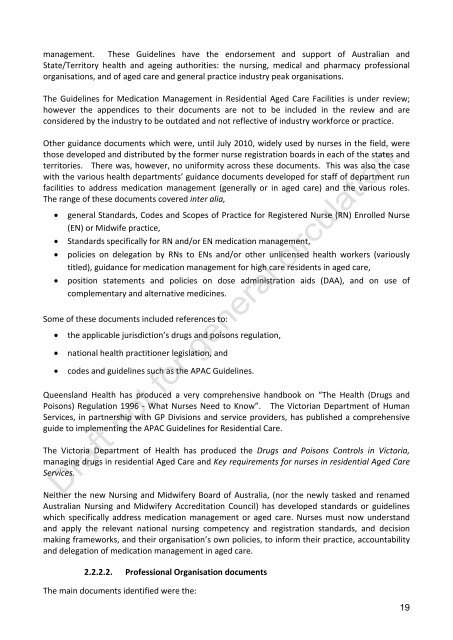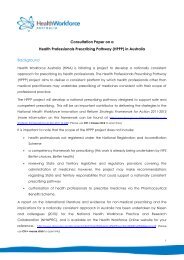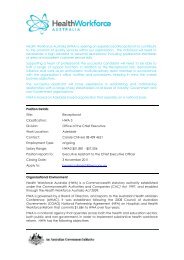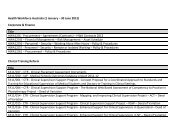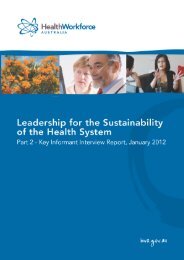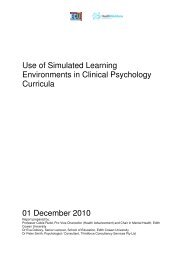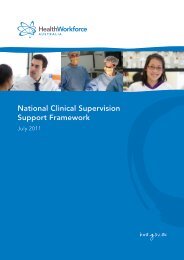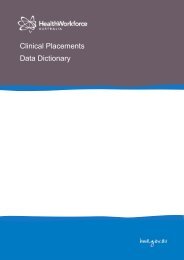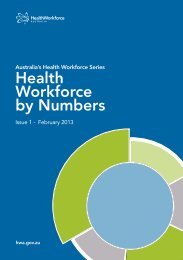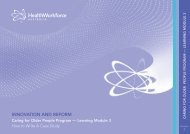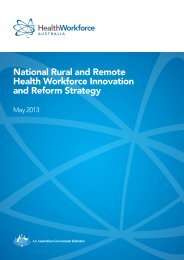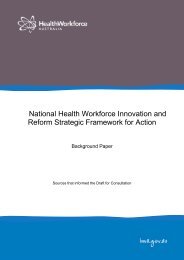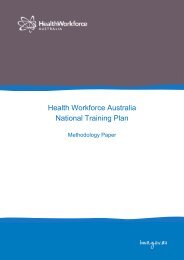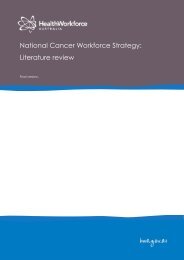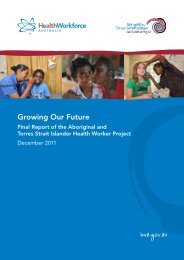SUMMARY - Safe Medications Management project: Key issues and ...
SUMMARY - Safe Medications Management project: Key issues and ...
SUMMARY - Safe Medications Management project: Key issues and ...
You also want an ePaper? Increase the reach of your titles
YUMPU automatically turns print PDFs into web optimized ePapers that Google loves.
management. These Guidelines have the endorsement <strong>and</strong> support of Australian <strong>and</strong>State/Territory health <strong>and</strong> ageing authorities: the nursing, medical <strong>and</strong> pharmacy professionalorganisations, <strong>and</strong> of aged care <strong>and</strong> general practice industry peak organisations.The Guidelines for Medication <strong>Management</strong> in Residential Aged Care Facilities is under review;however the appendices to their documents are not to be included in the review <strong>and</strong> areconsidered by the industry to be outdated <strong>and</strong> not reflective of industry workforce or practice.Other guidance documents which were, until July 2010, widely used by nurses in the field, werethose developed <strong>and</strong> distributed by the former nurse registration boards in each of the states <strong>and</strong>territories. There was, however, no uniformity across these documents. This was also the casewith the various health departments’ guidance documents developed for staff of department runfacilities to address medication management (generally or in aged care) <strong>and</strong> the various roles.The range of these documents covered inter alia,general St<strong>and</strong>ards, Codes <strong>and</strong> Scopes of Practice for Registered Nurse (RN) Enrolled Nurse(EN) or Midwife practice,St<strong>and</strong>ards specifically for RN <strong>and</strong>/or EN medication management,policies on delegation by RNs to ENs <strong>and</strong>/or other unlicensed health workers (variouslytitled), guidance for medication management for high care residents in aged care,position statements <strong>and</strong> policies on dose administration aids (DAA), <strong>and</strong> on use ofcomplementary <strong>and</strong> alternative medicines.Some of these documents included references to:the applicable jurisdiction’s drugs <strong>and</strong> poisons regulation,national health practitioner legislation, <strong>and</strong>codes <strong>and</strong> guidelines such as the APAC Guidelines.Queensl<strong>and</strong> Health has produced a very comprehensive h<strong>and</strong>book on “The Health (Drugs <strong>and</strong>Poisons) Regulation 1996 - What Nurses Need to Know”. The Victorian Department of HumanServices, in partnership with GP Divisions <strong>and</strong> service providers, has published a comprehensiveguide to implementing the APAC Guidelines for Residential Care.The Victoria Department of Health has produced the Drugs <strong>and</strong> Poisons Controls in Victoria,managing drugs in residential Aged Care <strong>and</strong> <strong>Key</strong> requirements for nurses in residential Aged CareServices.Neither the new Nursing <strong>and</strong> Midwifery Board of Australia, (nor the newly tasked <strong>and</strong> renamedAustralian Nursing <strong>and</strong> Midwifery Accreditation Council) has developed st<strong>and</strong>ards or guidelineswhich specifically address medication management or aged care. Nurses must now underst<strong>and</strong><strong>and</strong> apply the relevant national nursing competency <strong>and</strong> registration st<strong>and</strong>ards, <strong>and</strong> decisionmaking frameworks, <strong>and</strong> their organisation’s own policies, to inform their practice, accountability<strong>and</strong> delegation of medication management in aged care.2.2.2.2. Professional Organisation documentsThe main documents identified were the:19


